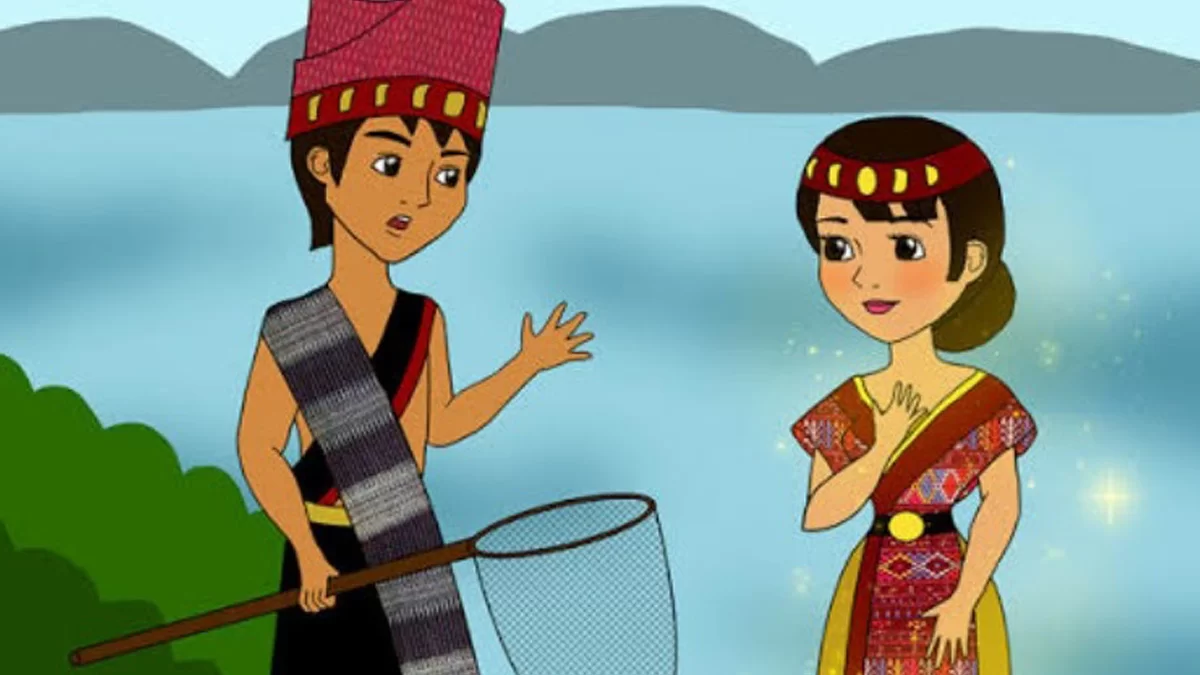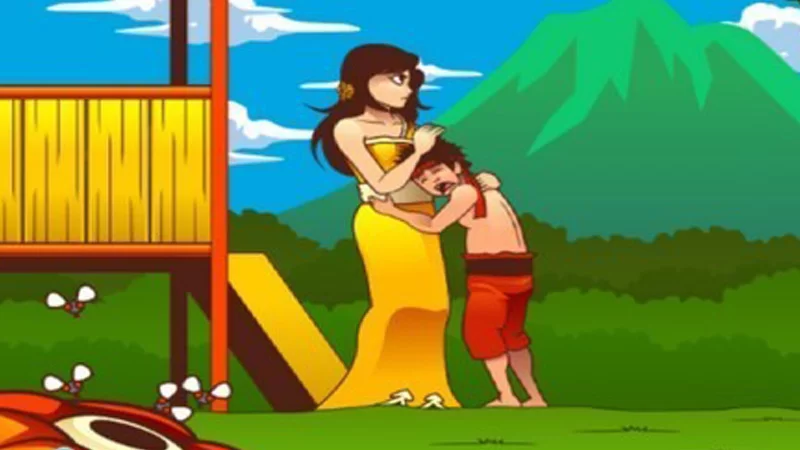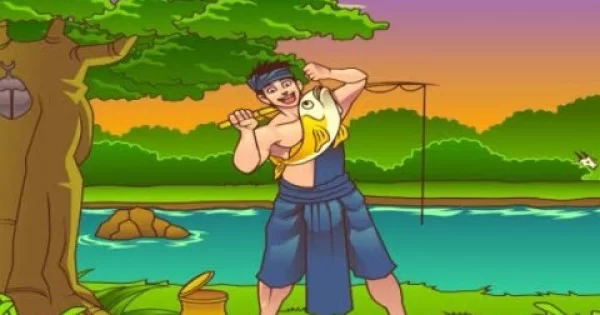NINNA.ID-A long time ago, in North Sumatra, there lived a poor young man in a valley named Toba. He had no parents, but the valley was beautiful, and anything he planted there grew wonderfully.
Toba lived by farming and fishing in the river near his home. The food he made was not special, but he never went hungry.
One afternoon, after working hard in the fields, he went fishing in the river. Today was not his day, though, and after hours of waiting, he still had not caught a single fish.
This had never happened before. Disappointed, he pulled his rod out of the water. But just as his rod was leaving the water, a fish bit it.
He pulled it out and was very happy to see a pretty goldfish on the end of the rod. The young man hurried home to cook the fish.
He got home, put the goldfish on the kitchen table, and ran out to get some firewood from the garden. As Toba went, he licked his lips and thought about the fish. How good it would taste!
But when he came back, the goldfish was gone! And where it had been, there sat three pieces of gold.
‘Good evening,’ came a soft voice behind him.
The man turned around and saw a beautiful woman standing in front of him. She had long, bright red straight hair that went down to her knees.
And she had no clothes on. The man turned red and looked at his feet.

‘Who are you, oh beautiful lady? And where did you come from?’ He said “oh” because it seemed right. She had to be magical.
‘I was that goldfish on your table. But I am no ordinary goldfish, as you can see.’ She played with her hair and smiled at him. ‘Those gold coins were my scales.’
The man looked at her, and then went red again and looked away. He had never seen such a beautiful woman before, and he was so lonely…
‘W-will you, will you marry me, oh beautiful lady?’
Toba held his breath as he waited for her answer. He knew it was a very bold question to ask, but in stories, men always asked women like that, all bold.
But the woman laughed. ‘I thought you would never ask. Believe me, it is a lonely life when you are a magical goldfish. I was waiting for someone to come and put their rod in my water… if you understand me.’
Now the man went as red as her hair. ‘R-really?’
‘Yes. But there is one condition.’ Suddenly, her smile disappeared, and the air in the room felt heavier. ‘You must never tell anyone that I was a fish. Do you understand?’
‘Oh, of course.’ The man hadn’t thought of telling anyone. He didn’t have any friends, and anyway, why would he tell them his beautiful wife used to be a fish? ‘But why, if I can ask?’
‘Just promise me. You won’t tell anyone, will you?’

‘No, no. I promise.’
The woman smiled and clapped her hands. ‘Well, then! I suppose we are married.’
‘Just like that?
‘Just like that.’
And just as naturally as it began, their marriage continued. They soon found that they were very similar. Although they had been lonely before, they only needed each other’s company to feel happy.
Soon they also had a son, who they named Samosir. Samosir grew as quickly as the flowers in the ground, and at six years of age, he was a strong and very naughty boy.
His mother was always asking him to help her clean the house and bring dinner to his father in the fields. Some days, Samosir did as he was told, but most days he shouted, ‘No!’ and ran off to play.
One day, as usual, Samosir was being naughty. He had refused to eat his breakfast, sang loudly while his mother worked, and now he was refusing to bring his father dinner.
‘Why don’t you do it?’ he said.
‘Because I’m cooking dinner for you!’ she said.
‘But I don’t want dinner.’
‘You will in an hour.’
‘How do you know?’
‘Because you’re a human, and humans get hungry at the same time every evening!’
‘I won’t get hungry.’
‘You didn’t eat your breakfast today. Of course you will.’
‘See? I wasn’t hungry this morning, so I won’t be hungry later!’
Eventually, Samosir’s mother convinced him to take a box of rice and fish to his father. It was a long walk through the fields, and as he went, Samosir started to feel hungry.
‘I guess Mum was right!’ he said. ‘Well, I’m sure Dad won’t mind if I just eat a few grains of rice…’
So he opened the box, and the rice looked so fresh and delicious, and the fish so hot and juicy. He ate just a little of both, but that only made him feel more hungry, so then he ate a bit more, and a bit more, and…
‘Oh no, I’ve eaten all of Dad’s dinner!’
All that was left were the fishbones. Hoping his father wouldn’t notice, Samosir put the bones back in the box, wrapped it up, and continued on his way.
When he found his father, he handed him the box, and was about to run away. But his father was hungry too, and he immediately opened the box and saw the bones.
‘Samosir!’ he shouted, and ran after the boy.
Samosir was fast, but his father was faster, and he quickly caught the boy.
‘Why were there only fish bones in the box? Did you eat my dinner?’
Samosir burst into tears, and cried loudly, saying, ‘Oh, Dad! It was horrible. A fox attacked me and ate all the food, and said I had to keep it a secret…’
‘Don’t lie to me!’ his father shouted. His cheeks were bright red.
‘I’m not lying!’
‘Yes you are, you son of a fish!’
And without warning, he slapped Samosir across the face. Samosir gasped and his mouth fell wide open. His father had never hit him before.
‘I’m not a son of a fish,’ said Samosir. He was crying again, but this time it was real.
Samosir turned and ran all the way home, and when he came into the house, he said, ‘Mum, am I the son of a fish?’ He meant it as a joke, but his mother’s face turned deadly serious.

‘Samosir. What did you just say?’
‘I said, “Am I the son of a fish?” Dad just said it to me…’
His mother started crying silently, and put her arms around him. ‘He has broken his promise.’
‘What, you really mean I am the son of a fish?’ He looked up at her face. ‘But you’re not…’
But as he spoke, his mother’s face started to change. It looked… smoother than before. And the light shone on it in a strange way.
After picking up the box, Samosir’s father thought about what he had said. It was a joke, but then he had slapped his son.
It was a stupid thing to do. It started to rain, so he ran towards the house.
He could see his wife inside, hugging Samosir, but just then lightning struck, and the two of them disappeared.
He ran inside, and looked all through the house for them. But they were gone. Where they had stood, there was a big puddle of water.
He stayed up all night, walking through the fields looking for them.
The rain went through his clothes and he shook with cold, but he did not find them.
When he finally gave up and went home, he found that all the gold coins in the house were gone.
It was only then that he realised just what he had done.
The rains continued for weeks, but the man fell into a deep depression.
He lay in his bed and listened to the rain and thunder outside, and cried. He did not work in the fields, or catch fish, and soon the small amount of rice he had was gone.
Not that it mattered, because the rains were so heavy that he couldn’t light a fire, and the valley started to flood.
The man stayed in his house for as long as he could. Surely the rains would eventually stop…?
But they didn’t, and finally he had to swim for his life, fighting the dancing waters and heavy rain. He didn’t last long, though, because his will to live had disappeared with his wife and his son.
The man was pulled down under the waters and never came back up. Still the rains went on and on, until the beautiful valley eventually turned into a lake.
When the rains stopped, people came to see the lake that had formed. Although the man had no friends, some people knew about him, and his strange but beautiful wife.
They knew he had died alone and miserable, although they did not understand where his wife and son had gone.
Because of his sad story, they called the place Lake Toba.
Toba meant “ungrateful”, and over time the name changed to Lake Toba.
In the centre of the lake was a small island, and this was called the Island of Samosir. Over time, the people forgot about the man, and he became just a story, but the lake stayed forever.
The End
The story taken from easystoriesinenglish.com
Edited by Damayanti Sinaga




.png)
No comments:
Post a Comment